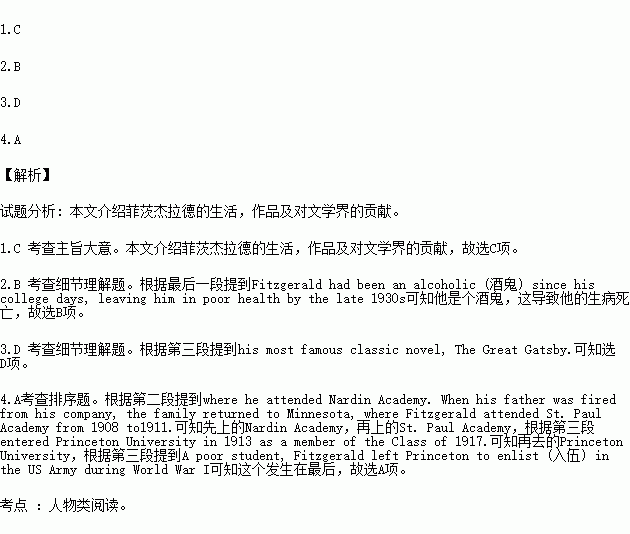题目内容
Francis Scott Key Fitzgerald was born on September 24, 1896. He was an American writer of novels and short stories, whose works are the typical writings of the Jazz Age, a term he created himself.
Born into an upper middle-class Irish Catholic family, Fitzgerald was named after his famous second cousin, Francis Scott Key. He was also named after his deceased sister Louise Scott, one of two sisters who died shortly before his birth. He spent 1898–1901 in Syracuse and 1903–1908 in Buffalo, New York, where he attended Nardin Academy. When his father was fired from his company, the family returned to Minnesota, where Fitzgerald attended St. Paul Academy from 1908 to1911.
He is widely regarded as one of the 20th century’s greatest writers. Fitzgerald is considered to be a member of the “Lost Generation” of the 1920s. He finished four novels, This Side of Paradise, The Beautiful and Damned, Tender Is the Night and his most famous classic novel, The Great Gatsby. A fifth, unfinished novel, The Love of the Last Tycoon was published after his death. Fitzgerald also wrote many short stories that dealt with themes of youth.
His first literary work, a detective story, was published in a school newspaper when he was 12. When he was 16, he was forced to leave St. Paul Academy for neglecting his studies. He attended Newman School, a prep school in Hackensack, New Jersey, in 1911–1912, and entered Princeton University in 1913 as a member of the Class of 1917. There he became friends with future critics and writers Edmund Wilson (Class of 1916) and John Peale Bishop (Class of 1917), and wrote for the Princeton Triangle Club. He was also a member of the University Cottage Club, which still displays Fitzgerald’s desk and writing materials in its library. A poor student, Fitzgerald left Princeton to enlist (入伍) in the US Army during World War I; however, the war ended shortly after Fitzgerald’s enlistment.
Fitzgerald had been an alcoholic (酒鬼) since his college days, leaving him in poor health by the late 1930s. Fitzgerald suffered a mild attack of tuberculosis in 1919, and died of a heart attack in 1940.
1.What does the passage mainly talk about?
A. The “Lost Generation” of the 1920s.
B. How Fitzgerald got his name.
C. The life and works of Fitzgerald.
D. Fitzgerald and the Jazz Age.
2.What led to Fitzgerald’s early death according to the passage?
A. His poverty.
B. His heavy drinking.
C. The poor working conditions.
D. The pressures of work.
3.Which is the most famous work of Fitzgerald?
A. This Side of Paradise.
B. The Beautiful and Damned.
C. Tender Is the Night.
D. The Great Gatsby.
4.What’s the right order of the events related to Fitzgerald?
a. He attended Nardin Academy.
b. He entered Princeton University.
c. He attended St. Paul Academy.
d. He joined the US Army during World War I.
A. a,c,b,d B. a,d,b,c
C. b,d,a,c D. b,a,c,d
 口算题天天练系列答案
口算题天天练系列答案在很多公共场合,我们都可以看到“中式英文”(Chinglish)的标志,我们是否应该彻底清理这些Chinglish呢?请结合下面信息,以“Should We Get Rid of Chinglish?”为题,写一篇英语短文。
赞成 | 1.外国人很难看懂。 |
2.我们应该学习标准英文。 | |
反对 | 1.“中式英文”丰富了英语本身。 |
2.“中式英文”为我们的生活增添了情趣。 | |
你的观点 | ? |
注意:1.词数:100左右;
2.可适当发挥,以使行文连贯。
________________________________________________________________________________

